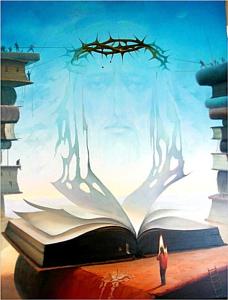My son Christian submitted the following study of Jeremiah 4 for a class assignment.
Jeremiah 4:23-26
23 I beheld the earth, and indeed it was without form, and void;
And the heavens, they had no light.
24 I beheld the mountains, and indeed they trembled,
And all the hills moved back and forth.
25 I beheld, and indeed there was no man,
And all the birds of the heavens had fled.
26 I beheld, and indeed the fruitful land was a wilderness,
And all its cities were broken down
At the presence of the LORD,
By His fierce anger.
1. Jeremiah is prophesying during the last forty years of the kingdom of Judah, right up until it was conquered by the Babylonians. The main bent of his writings point to Judah’s need for repentance, and Yahweh’s promise of restoration if they do. His ministry spanned the reigns of five kings of Judah: Josiah, Jehoahaz, Jehoiakim, Jehoiachin, and Zedekiah. (The fact that Jeremiah is prophesying during the days of Josiah is interesting. 2 Kgs 23:25 says, “Now before him there was no king like him, who turned to the LORD with all his might, according to all the Law of Moses; nor after him did any arise like him.” Josiah instigated a major reformation in Judah, and was one of the most righteous kings the kingdom ever had. Yet, in Jer. 3:6-11, Yahweh says to Jeremiah, “in the days of Josiah the king, ‘Have you seen what backsliding Israel has done? . . . Backsliding Israel has shown herself more righteous than treacherous Judah.’” Even the reign of righteous Josiah is not enough to wipe the sins of Judah clean.
2. Jeremiah is clearly referring back to Creation (Gen. 1:2): “The earth was without form, and void; and darkness was on the face of the deep.” In fact, these are two of only three places where this specific phrase (“formless and void”) appears in the Bible, the other being Is. 34:11. Jeremiah is using this image to convey the idea of a dramatic decreation: God is going to unmake the world. This kind of catastrophic language is often used when talking about the death of a king or the fall of a city. [Clearly, since that’s exactly what Jeremiah’s describing here.]
3. Just as Yahweh looked and “saw” that the earth was good, so Jeremiah looks and “sees” mountains trembling, birds fleeing, man disappearing, and cities broken down. The same Hebrew word ( ra’ah ) is used in both contexts, a four-fold sight, but Jeremiah is watching the world slowly fall into nothing. In v. 24, Jeremiah sees the hills moving “lightly” or, in the NKJV, moving “back and forth.” The word used is qalal , which in other places can mean something like “to be of little account,” “contemptible,” or “trifling.” During this radical decreation, even the high hills are made to be nothing. They are brought low, too low to even be worthy of their name.
Jeremiah is obviously describing the destruction of Jerusalem. By setting us up with v. 23, he invites his audience (both the Jews and us) to think in terms of the Creation, when the whole earth was “without form, and void.” If heavenly light-bearers signify rulers (Gen. 1:16), then Judah will be without her king (Jer. 4:23). In fact, vv. 23-26 go through acts in Creation that God calls “good” and undoes them. Judah is rotten, and God is removing the goodness from the land, “unmaking the world” to fit its inhabitants.
In Gen. 1, the LORD pronounces seven things towb , or good, and Jeremiah watches at least six of these things disappear.
v.4 – light: “good”
v.10 – God divides the waters: “good”
v.12 – earth yields grass and fruit trees
v.15 – heavenly bodies
v.21 – birds and fish
v.25 – earth brings forth animals
v.31 – Man is created as capstone, given role as keeper, all pronounced “very good”
In Jer. 4, Jeremiah watches and sees ( ra’ah ) that:
v.23a – the earth is formless and void
v.23b – the heavens had no light
v.24 – the mountains are “trembling” and the hills “moving lightly;” another way to translate this might be to say that the mountains and hills collapsed, or “were brought low” (cf. Is. 40:4)
v.25a – there was no man
v.25b – the birds have fled
v.26a – a fruitful garden is turning into a wilderness
These parallels can be roughly matched up, and it’s clear in any case that Jeremiah is watching the end of Creation. The three levels of Creation (sky, land, sea) are each being undone. God is wiping the slate clean, and at this point (v. 26), we don’t know if He will ever start again.
The Jeremiah passage can also be arranged parallel to itself:
-formless earth (v.23)
-lightless heaven (v.23)
-mountains shaking, hills trembling (v.24)
-no man (v.25)
-birdless heaven (v.25)
-wilderness, broken cities (v.26)
-Anger of Yahweh (v.26)
If this analysis is valid, it means that the formless earth ought to be matched up with the absence of man, which of course implies its opposite, that the presence of man and a well-ordered earth go hand in hand. Not only is the continued existence of earth necessary for the well-being of man, man’s presence is necessary for the structure of the universe to remain intact.
The connection between the mountains (v.24) and the wilderness (v.26) might need a little more explanation. Judah was a land defined by its mountains (Carmel, Moriah, Mount of Olives, Zion), and the shaking of the mountains means a shaking of the political structure. The fruitful mountains of Jerusalem have become an unlivable wasteland. Additionally, the temple was built on a mountain in Jerusalem, so if God is shaking the mountains, He is dissatisfied with His house there. This fits with the breaking down of the cities (see below): the Israelites broke covenant with Him, and so He breaks the covenant, too (cf. Ex. 32).
All throughout this passage, the references to Isaiah abound. In fact, the phrase “formless and void” as such only appears in Gen. 1, Jr. 4, and Is. 34: “And He shall stretch out over it the line of confusion [formlessness] and the stones of emptiness [void].” Isaiah and Jeremiah are both prophesying to the people of Judah, so it is understandable that their prophecies would be similar. It is their differences that are more interesting. When Isaiah uses the phrase “formless and void” (or its nominalization), it is still hypothetical. Yahweh promises that he will judge his people if they do not repent, and He goes into great detail about just how bad that judgment will be. But, of course, it hasn’t happened yet. When Jeremiah speaks of decreation, however, he speaks as if it has already happened. “I beheld the earth . . . (v.23)” His visions tell him that the destruction is inevitable, so it’s as if it has already taken place.
4. In v. 26, Jeremiah lays on the allusions, and lays them on thick. “Fruitful land” recalls to mind the “land flowing with milk and honey” that the Israelites were promised, and the word for that is even karmel , or Carmel, a mountain that is often synonymous with the land. This karmel turns into midbar , which means wilderness. The Hebrew title for the book of Numbers is bamidbar (which just means “In the Wil
derness”), and it describes the wanderings of the children of Israel as they waited for God to lead them into the promised land. Here in Jer. 4, Carmel is turning back into the wilderness: the Israelites are being cast out of their land.
Verse 26 also refers to cities that have been broken down. The phrase “broken down” is used most often to refer to the casting down of idols (Ex. 34:14; Lev. 11:35; Jdg. 2:2, etc.). In keeping with the context that Jeremiah has given us (the Exodus from Egypt and the conquest of Canaan), we can infer that God is casting down the cities because they refused to obey Him by casting down the altars of their false gods. Judah has been unfaithful, and God will break down their cities just like the pagan idols they worship.












